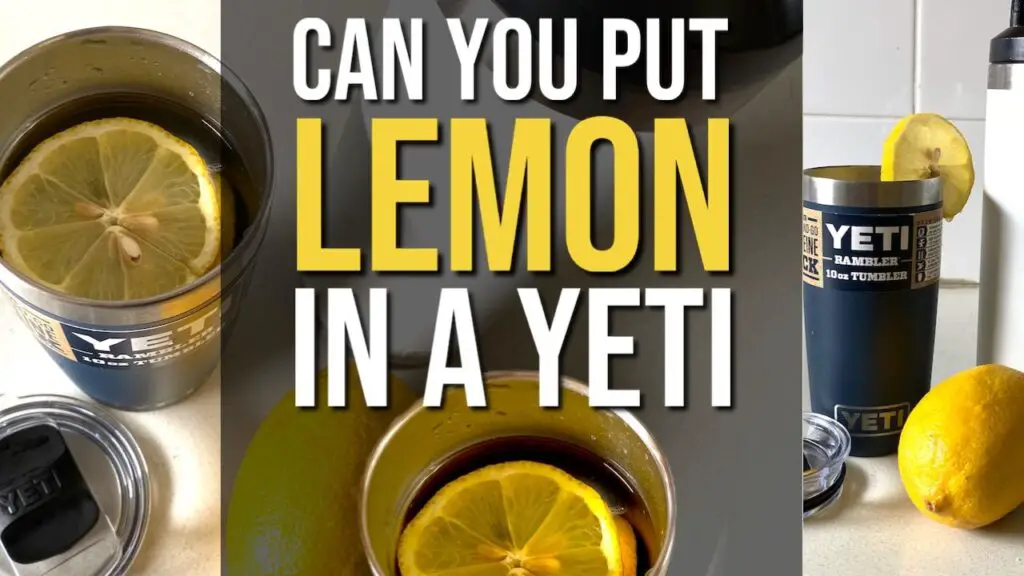
Can you put lemon juice or lemon water in a Yeti cup or bottle or will it cause damage to your Yeti and make it taste bad?
Yeti tumblers and Yeti bottles are great at keeping water ice cold all day long. They are great at encouraging you to drink more water because you don’t have to worry about lukewarm or hot water after leaving it out in the sun.
A lot of us like to add a bit of lemon juice to our water to make it taste nice and fresh as well as to gain the health benefits from the lemon juice. But can you put lemon juice in a Yeti or will it cause damage to your Yeti cup or bottle?
Yes, you can put lemon juice or lemon water in a Yeti cup or bottle. While acidic, lemon juice should NOT react with the stainless steel Yeti tumblers are made from. However, some people claim lemon juice does create a metallic taste or that it can leech metals into your drink.
After doing way more research than was necessary to answer this question I’ve come to the conclusion that there is actually no definitive answer on this topic. But generally speaking I don’t see any major health risks to doing it.
Why Are People Concerned About Lemons In Their Yeti?
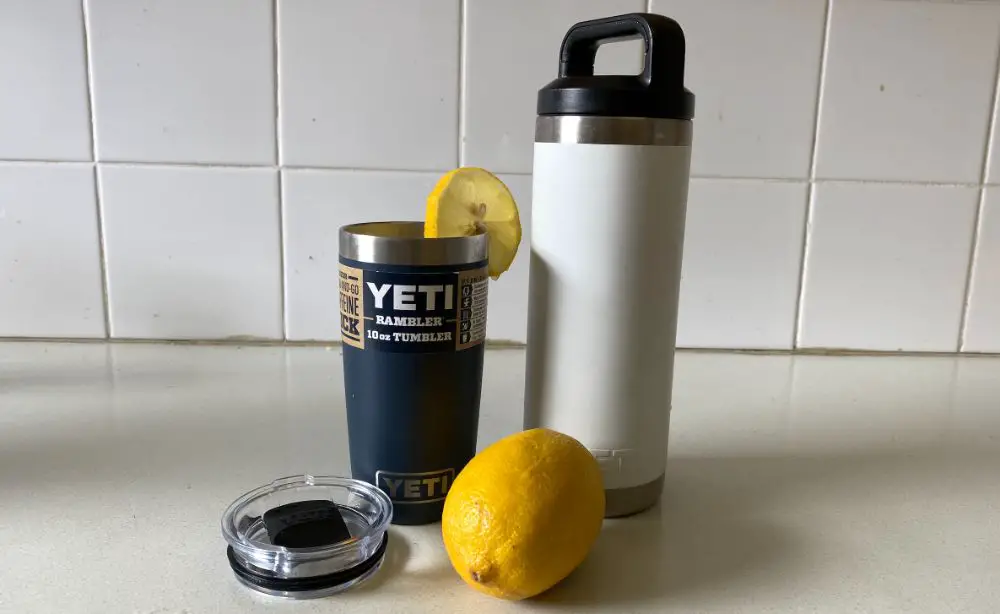
Lemans are full of citric acid and are one of the most acidic fruits out there. Lemons have a PH between 2-3 making them 100,000 times more acidic than water (according to healthline).
You likely know that acid can be quite corrosive and extended contact with metal can cause particle leeching which could lead to micro-metal particles getting leeched into your lemon water.
This could make your drink taste weird or it could pose health risks to some people.
See the latest prices of Yeti Tumblers at Yeti.com
(or compare to prices of Yeti Tumblers at Amazon)
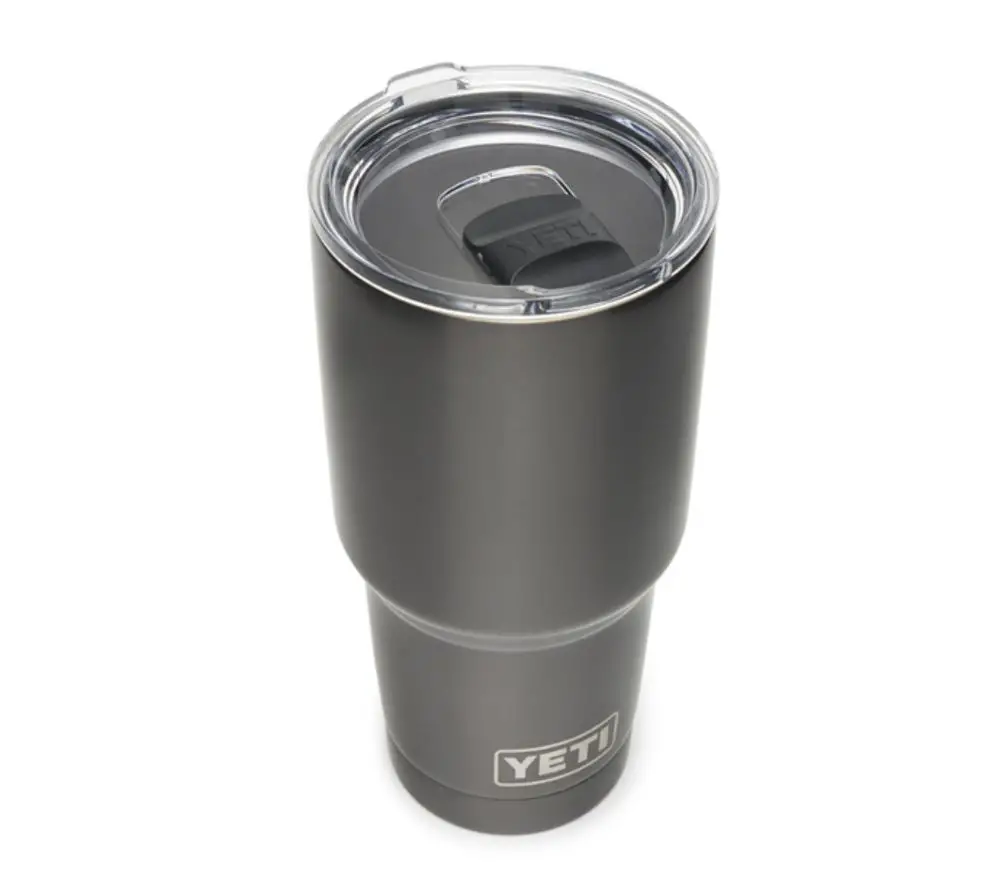
Is Lemon Water Safe In Your Yeti?
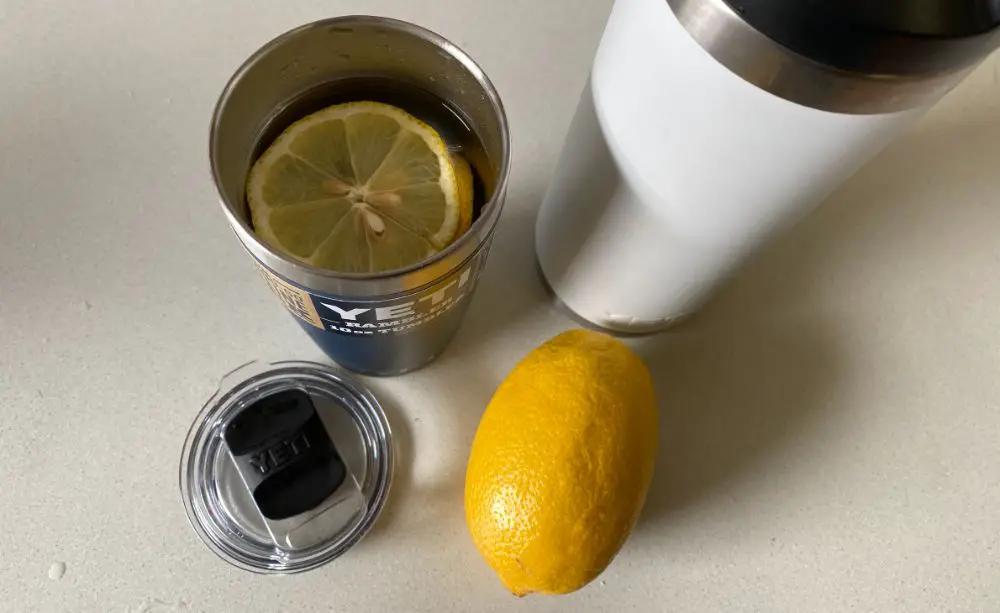
My best friend loves a bit of lemon water and my girlfriend loves having hot lemon water when she is feeling sick. She basically chugs the stuff haha.
I wanted to find out for them if lemon water was safe to use in our Yeti cups, as well as if it is safe in any other stainless steel cups or water bottles.
What People Are Saying about Lemon Water in Yetis?
This question was asked here on Quora with mixed responses. Some saying the lemon juice will cause corrosion while others were saying it would be fine and stainless steel is much better than an aluminum bottle.
Here’s one comment from that post:
lemon juice is highly corrosive and extensive contact w/metal—even stainless steel quality—containers could cause micro-particle metal leaching which could result a consumer also inadvertently ingesting micro-metal particle (icky) corrosion.
There was also a bunch of posts on Reddit (here, here and here) where people asked the same sorts of questions but about a variety of brands of water bottles and most normal people write back and say they have no issues with it. There were some minor complains about a sour smell but it’s unsure if this is a reaction with the stainless steel or the lemon going bad over time…or lemon is just sour in general.
What Do The Scientists and Metal Workers Say About Lemon in Yeti Cups or Bottles?
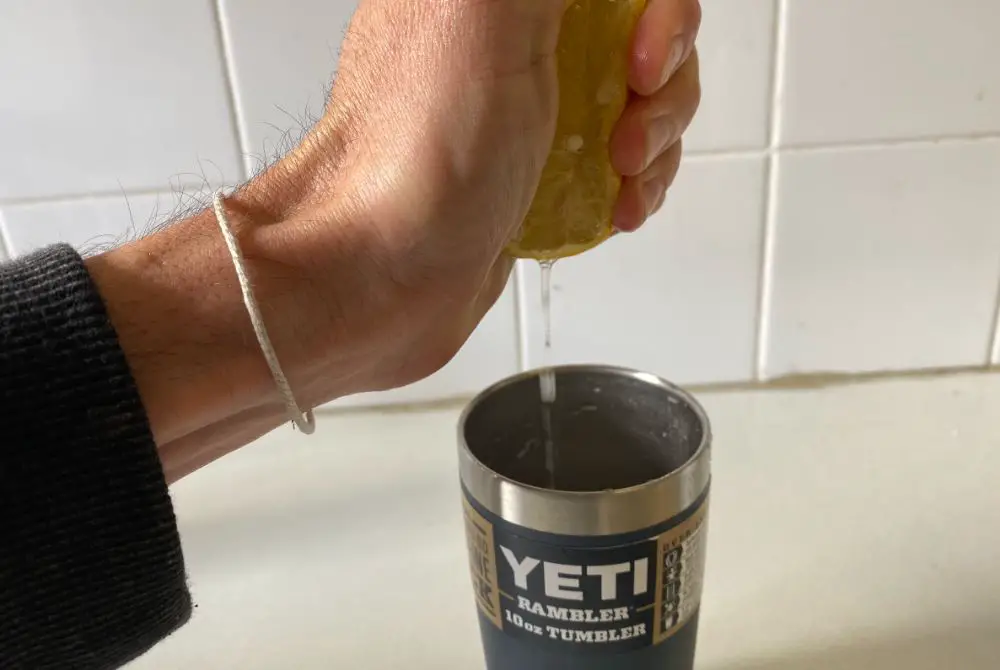
This is where I started to go down the rabbit hole and do way more research than I needed to in order to try and answer this question.
See so far the responses have been from normal people like you and me. Basically people giving their best guesses.
But then I found this great post on Finishing.com. This is a website dedicated to people who work in metal finishing. I didn’t know this subculture existed but I’m glad it did.
Someone was asking about how lemon juice (used in guacamole) see to affect the flavor when used in a stainless steel bowl. The person noted a metallic taste to the item.
While I personally can’t taste stainless steel my partner swears she can and if I put her coffee in a Yeti cup she says it ruins the flavor.
Anyway, this article was a super interesting read and I learned a lot. The biggest things I learned were:
18/8 Stainless Steel is Corrosive Resistant
Yeti cups are made out of what’s called 18/8 stainless steel, also known as “Grade 304”.
This is made up for 18% chromium (for corrosion resistance) and 8% nickel (for strength). This is a super common grade of stainless steel as is corrosion resistant and considered safe for use in everything from cutlery to cookware to drinkware.
This quote from Ray Kremer sums it up nicely:
I can’t quote chapter and verse to you, but the FDA has long approved of 304/316 stainless steel as a safe material for contact with pretty much everything. If you can track down a citation I would hope that would trump your state department of agriculture.
Klean Kanteen Founder Wasn’t Confident In Lemon Water
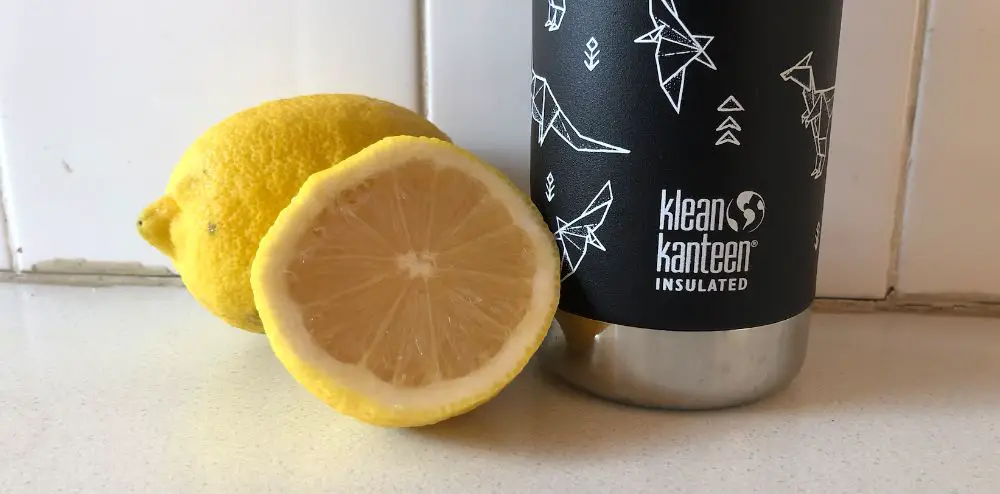
There is a comment in this thread that is apparently from Robert Seals (not verified) who started Klean Kanteen.
This was concerning because he basically implied that he would only feel comfortable drinking water from stainless steel bottles, not lemon juice or lemon water. He says:
A. I am Robert Seals the inventor of Klean Kanteen which started the stainless vs plastic revolution; I sold the company years ago. I had the bottles tested back then because as a metal worker I was concerned about electropolishing, which I did not trust. Using an acid equivalent to lemon juice it was found to leach nickel over the acceptable amount allowed by FDA standards. I was concerned enough to print FOR WATER ONLY on the bottles as the same tests showed no detectable metal when water was used.
Electro polishing is not the way to passivate any food container. The old fashioned polishing method is by far is the best way to seal the metal but it’s too labor intensive for production. The public is being duped on this one. Robert Seals
Klean Kanteen makes products very similar to Yeti. They have insulated water bottles and tumblers.
However, it’s unsure if they used a citric acid (like that in lemons) for this test of some other type of acid.
From that article I gathered that having lemon water in a Yeti cup SHOULD be ok, but there is some potential for metal leeching into your drink. However, it seems no one has really tested this properly.
Will Putting Lemon In Your Yeti Make It Taste or Smell Bad?

As I was going through and looking into this more I noticed a bunch of people saying that after having lemon water in their Yeti they noticed a more metallic taste in their drinks afterwards. Even if the next drink was something as simple as water.
There is some potential that Yeti cups may leech metals into your drinks and that the acidity of lemon water could corrode the stainless steel and make leeching more likely.
That may be what is causing the change in flavor of the drinks even after the lemon water has been cleaned out.
See stainless steel doesn’t rust because the chromium reacts with the air and forms a protective layer of chromium oxide which protects the rest of the metal from the outside elements.
However, maybe lemon juice can break down this chromium oxide layer allowing for more corrosion?
Just in case I’ve done a full article on whether or not metal leeching from Yeti cups or bottles could cause cancer. This was another deep dive article looking at all the research.
Long story short, even if metal is leeched into your drink from the lemon juice it seems unlikely that it would cause any major health problems.
Plastic Is Likely Worse
If you’re considering plastic instead of stainless steel then think again. The acidic nature of lemons is much more likely to cause plastic to leech chemicals into your drink and these chemicals are likely more harmful than those from stainless steel.
This quote from a Quora answer sums it up:
the acid in lemon cause plasticizing agents to leach out of plastic
If you’re looking for the lesser evil then it seems stainless steel is a better option that plastic. But glass or ceramic may be even better than both of them.
If you want the best of both worlds you can get ceramic lined insulated tumblers as well as glass lined insulated tumblers. They are made of stainless steel but have an inner lining of glass or ceramic to stop the metal affecting the flavor.
Will Lemon or Lemon Water Affect Your Yeti Lids?
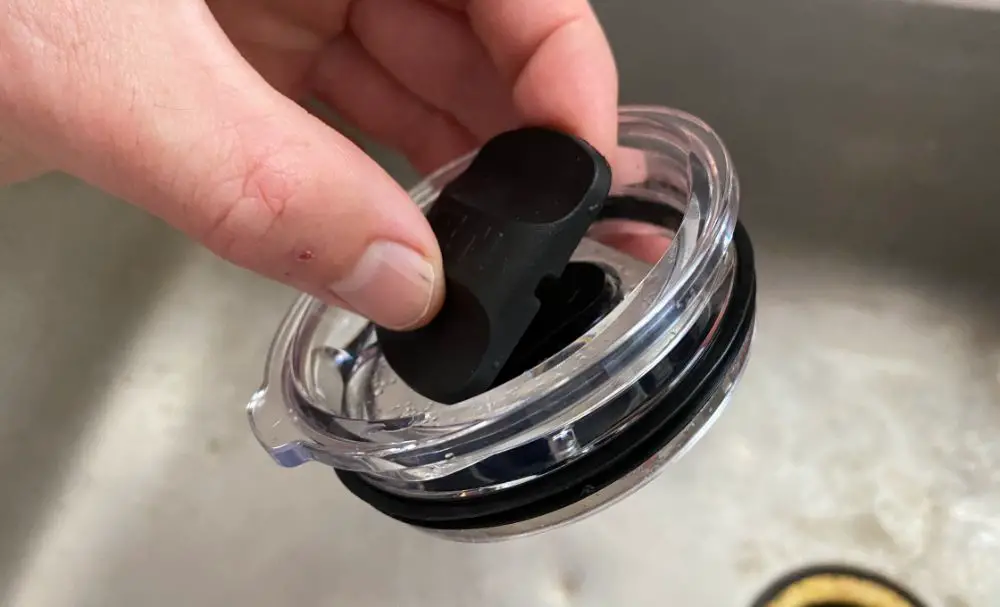
Given that lemon juice is so acidic it can break down plastic I would personally be concerned about the effect it might have on my Yeti lids.
This is true for both tumbler lids as well as Yeti bottle lids, all of which are made from plastic.
Yeti lids don’t contain BPA, which is well known to be harmful, but I don’t know if the lemon juice would leech other harmful chemicals from the plastic into your drink.
But pretty much every bottle is going to have this issue. Even glass bottles or ceramic cups often have plastic lids.
I couldn’t find any Yeti lids that were made from stainless steel as opposed to plastic.
Given that lemon juice is so acidity then I would personally be concerned that while the stainless steel may be fine with your lemon water the plastic lid of your Hydro Flask may not.
Hydro Flask lids don’t contain BPA, which is known to be a harmful substance, but I’m still not completely confident that lemon juice wouldn’t leech other harmful chemicals into my drink.
How To Clean The Lemon Taste Out Of Your Yeti
If, after having lemon juice or lemon water in your Yeti cup, you’re finding that you can’t get the taste of lemon or the taste of metal out of your drinks then there are some things that you can do to remove this taste:
Run It Through The Dishwasher
Yeti tumblers and bottles are dishwasher safe and completely fine to be put in the dishwasher.
So throw it in there, let the dishwasher run it through a cleaning and drying cycle and often this intense cleaning process will leave your Yeti tasting and smelling brand new.
Vinegar Swirl
One of the simplest ways to do this is to fill up your Yeti with a bit of vinegar and put the lid on and give it a shake. Leak the vinegar to sit for 15-30 minutes before washing it out.
The vinegar should get rid of that lemon smell and taste as well as any metallic taste.
Sacrificial Water
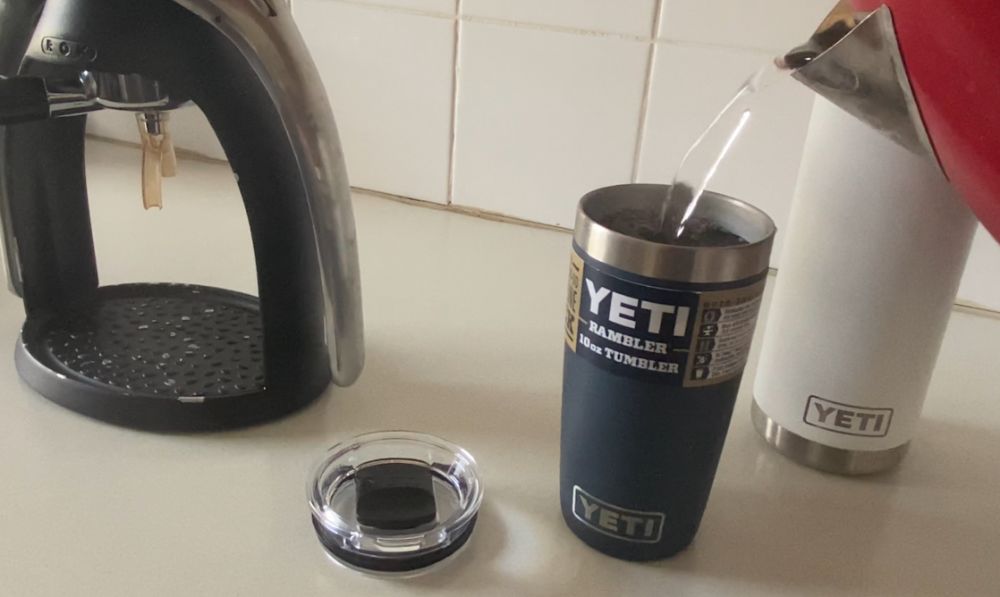
Boil some water and fill your Yeti up to the brim with boiling water and leave it to sit for a few hours allowing the water to absorb the residual smell/flavor.
Then tip the water down the sink and repeat the process again multiple times if you need to.
Dry Rice Clean
Sometimes drinks can leave a residue on the inside that is hard to clean off. This is more true for the Yeti bottles than it is for the tumblers which is easy to clean.
In my article on getting rid of smells and mold in your Yeti this is one of the best ways to clean the inside of a hard to reach bottle or tumbler.
- Put a little bit of dry rice (white or brown) in your Yeti
- Put some water in it (or vinegar or detergent if you wish)
- Close the lid and shake vigorously for 3-5 minutes
- Drain out the water
- Throw rice in the bin
- Rinse out thoroughly
The little bits of rice act as an abrasive cleaner getting into all the tough spots and cleaning away any weird smells or flavors that could be coming from residue on the inside of your Yeti.
Can You Put Fruit Juice In a Yeti Cup or Bottle??
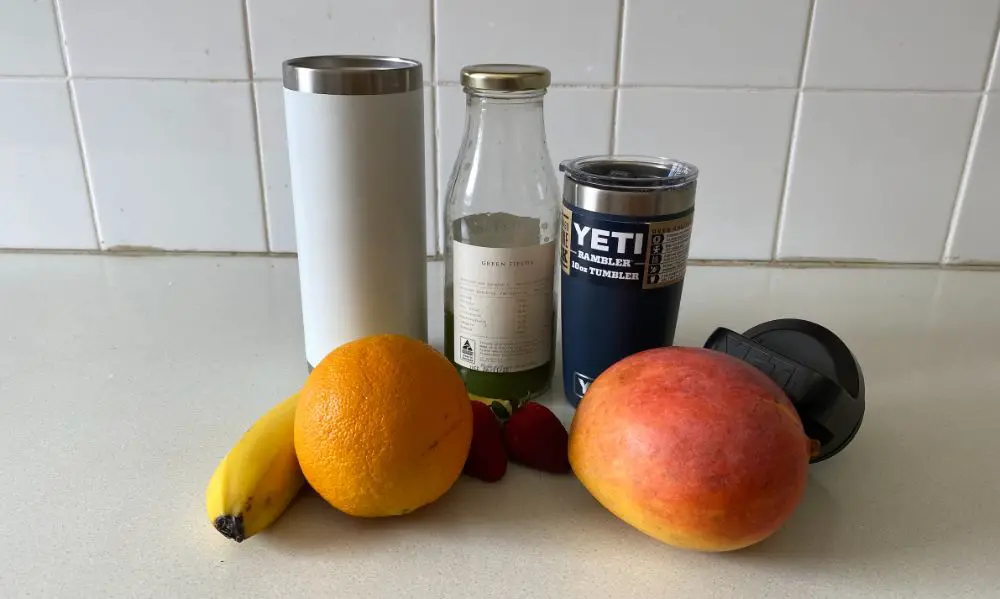
Some people love lemon water and others love to infuse fruits into their water as a way to improve the flavor and add important vitamins and minerals to their drink.
Yes, it’s find to put juice or fruit infused water in a Yeti cup of bottle. The vacuum insulated Yeti cup will keep it cold for hours and the stainless steel shouldn’t react with the juice or affect the flavor.
Lemons are one of the most acidic fruits and we’ve talked in length about whether or not you should put lemon juice in your Yeti already. Most other fruits are less acidic than lemons.
The only exception to this is limes which is considered slightly more acidic than lemons, but no one is really drinking straight lime juice.
Other fruits that are also high in acidity (according to the master list) are cranberries, chilli sauce, grapes, plums and vinegar. Those these are generally around a PH level of 2.8 whereas lemons are 2.0-2.6.
If you want to infuse fruit into your water in your Yeti then these little fruit infusers are a good way to do it.
See the latest price of mini fruit infusers at Amazon
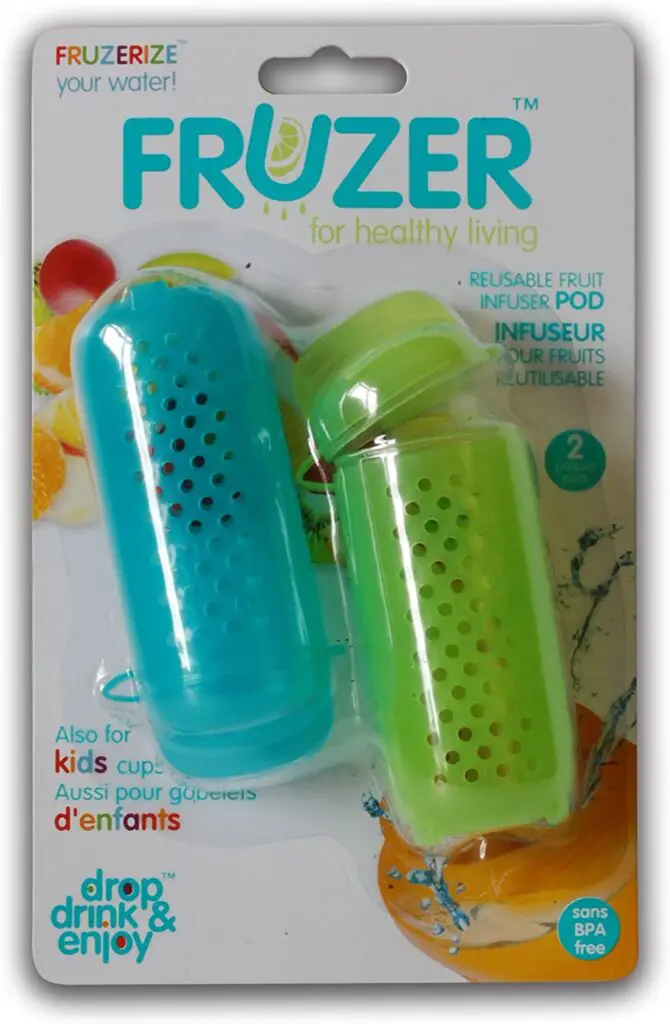
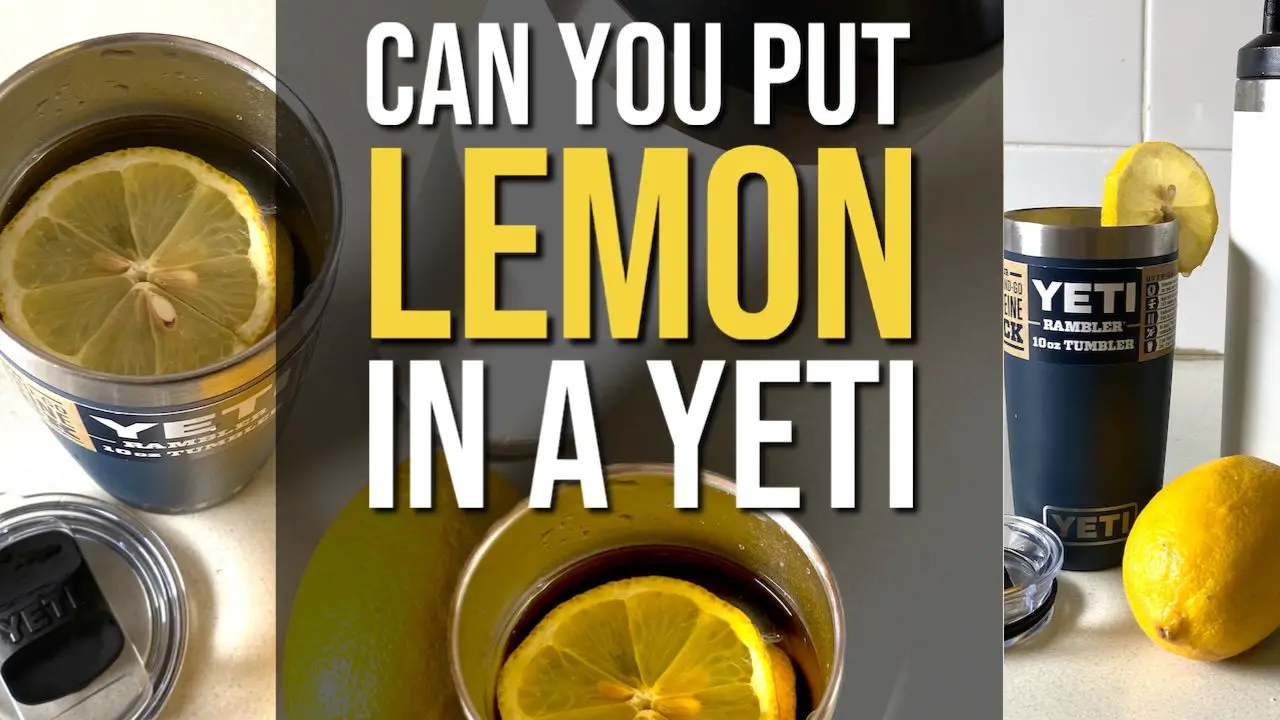
Leave a Reply